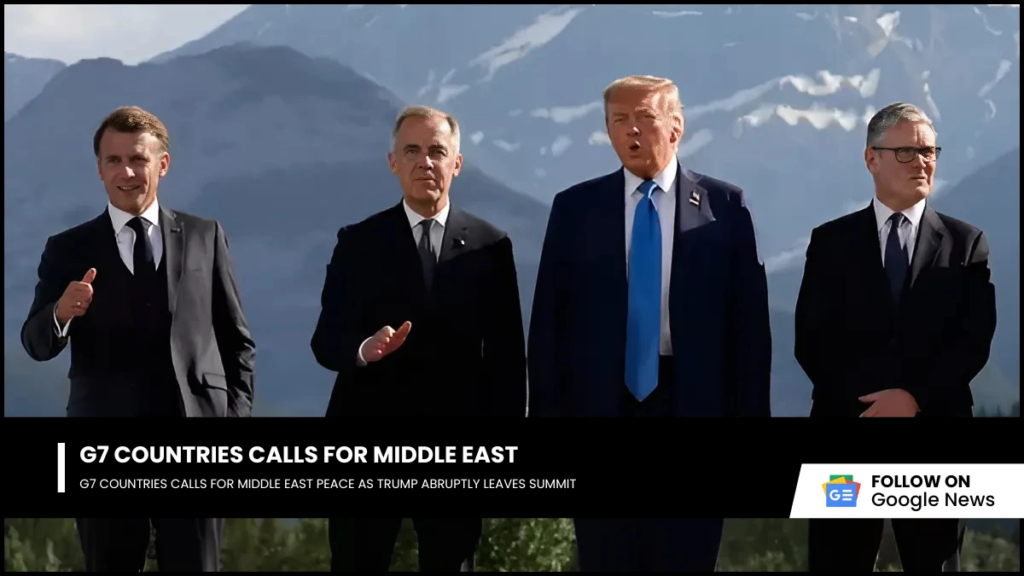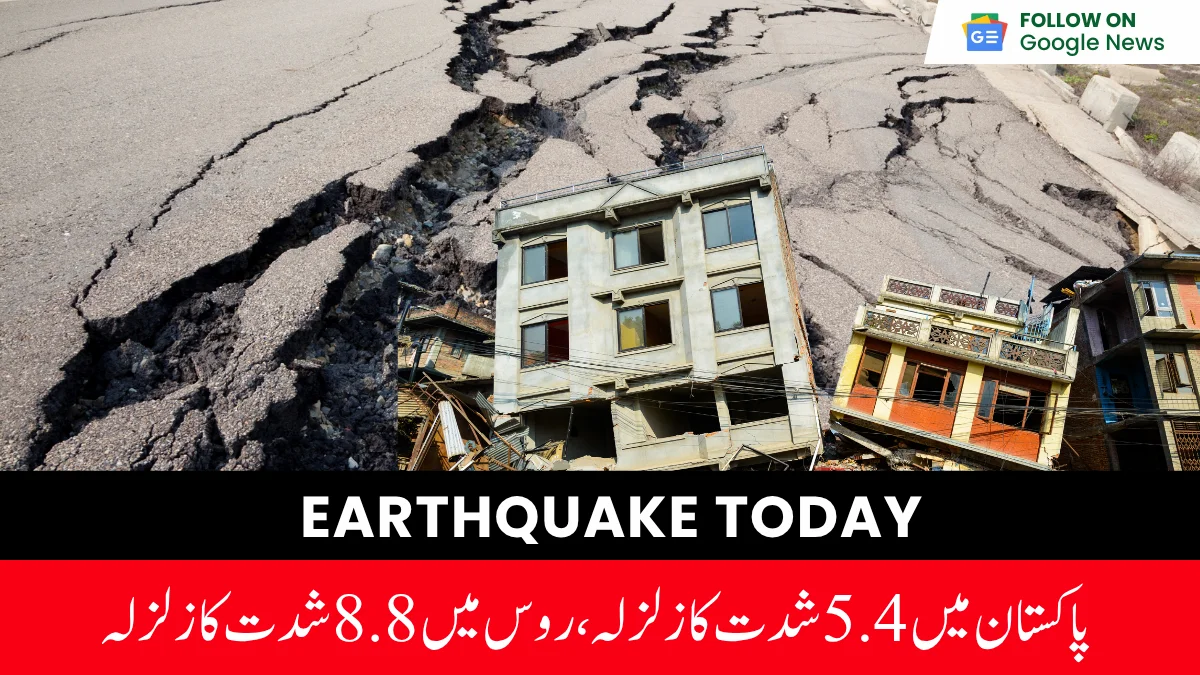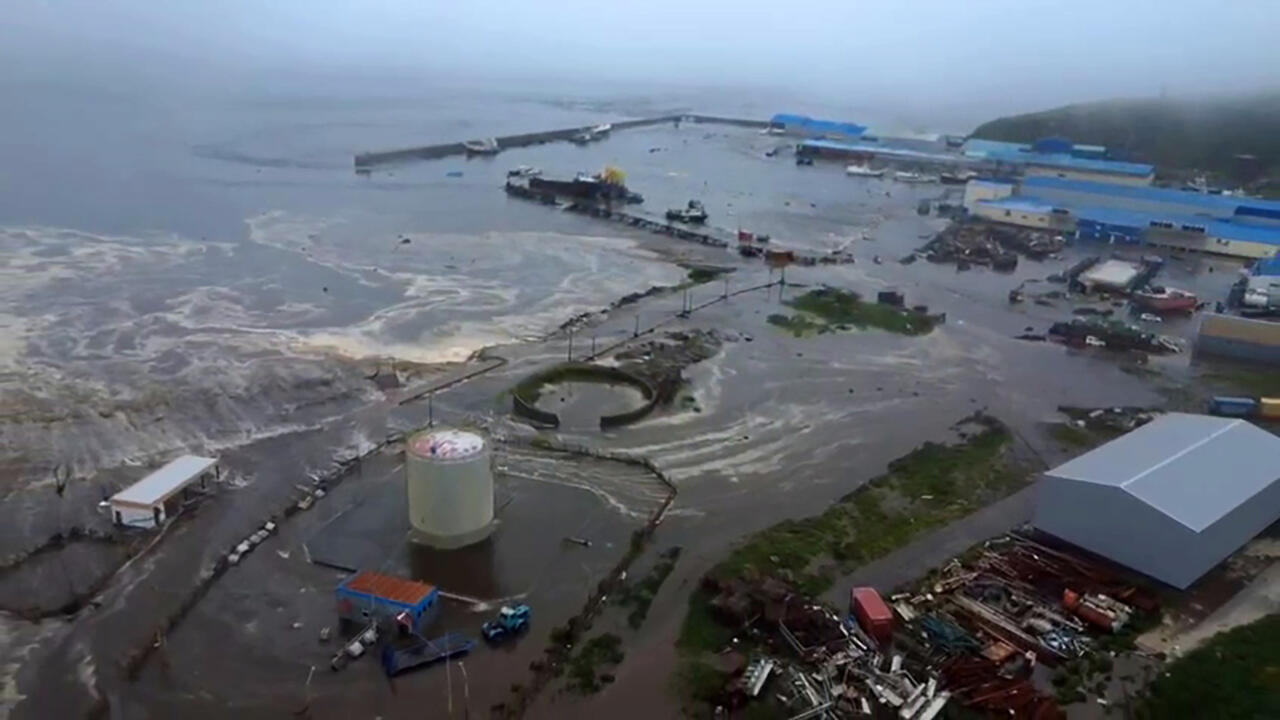
G7 Countries Calls for Middle East Peace as Trump Abruptly Leaves Summit
- Zain Ul Abideen
- Reading Time 6

G7 leaders issued a unified call for de-escalation in the Middle East, focusing on the escalating Israel-Iran conflict and advocating for a Gaza ceasefire, as U.S. President Donald Trump unexpectedly left the G7 summit in Canada. The abrupt departure, coupled with conflicting statements about a potential ceasefire, has raised questions about U.S. foreign policy and the G7’s role in addressing global tensions.
G7’s Push for De-escalation
The G7—comprising Britain, Canada, France, Germany, Italy, Japan, and the United States—released a joint statement on June 16, 2025, urging a resolution to the Israel-Iran conflict to pave the way for broader peace in the Middle East. Hosted by Canada, the summit emphasized a ceasefire in Gaza and stressed that Iran “can never have a nuclear weapon.” The statement balanced support for Israel’s right to self-defense with a call to protect civilians on both sides amid rising casualties.
“We urge that the resolution of the Iranian crisis leads to a broader de-escalation of hostilities in the Middle East, including a ceasefire in Gaza,” the G7 statement read, as reported by Canadian officials.
Israel-Iran Conflict Intensifies
Tensions between Israel and Iran escalated sharply after Israel launched widespread airstrikes on June 13, 2025, targeting Iran’s nuclear facilities, military sites, and civilian areas under an operation codenamed “Rising Lion.” The strikes killed top Iranian commanders, scientists, and civilians, with Iranian media reporting over 224 deaths and 1,000 injuries, mostly civilians. Israel reported 24 civilian deaths from Iranian retaliatory missile strikes on Tel Aviv and Herzliya, which targeted strategic sites.
Iranian air defenses were activated in Tehran and Natanz, home to key nuclear installations, as explosions rocked the capital on June 17, 2025, at approximately 1:39 PM PKT (Pakistan Standard Time, UTC+5). The International Atomic Energy Agency (IAEA) confirmed extensive damage to the Natanz nuclear plant, with around 15,000 centrifuges destroyed, though the Fordow facility remained largely intact.
Trump’s Early Exit Sparks Confusion
President Trump’s sudden departure from the G7 summit on June 16 fueled speculation about his intentions. Initially, French President Emmanuel Macron suggested Trump left to work on a ceasefire proposal between Israel and Iran. “There is indeed an offer to meet and exchange,” Macron told reporters, noting a potential U.S.-led initiative to restart negotiations.
However, Trump refuted these claims on his Truth Social platform, stating, “Macron mistakenly said that I left the G7 Summit to work on a ‘ceasefire’ between Israel and Iran. Wrong! It certainly has nothing to do with a ceasefire. Much bigger than that.” The White House later clarified that Trump’s return to Washington was related to Middle East developments but provided no specifics.
U.S. Policy: Diplomacy or Escalation?
Trump’s stance on the Israel-Iran conflict has been inconsistent. He has repeatedly emphasized that Iran must not acquire nuclear weapons, aligning with Israeli Prime Minister Benjamin Netanyahu’s position. However, while Netanyahu pushes for military action, Trump has expressed a preference for diplomacy, citing his desire for a nuclear deal with Iran. On June 16, he posted on Truth Social, urging Tehran residents to evacuate immediately and lamenting Iran’s refusal to sign a nuclear agreement.
Despite these calls for diplomacy, Trump has not ruled out U.S. military involvement. Israeli officials claim their strikes were “fully coordinated” with the U.S., though the White House insists U.S. forces remain in a defensive posture. U.S. Defense Secretary Pete Hegseth, speaking on Fox News on June 17, reaffirmed Trump’s pursuit of a nuclear deal, stating, “We are postured defensively in the region to be strong in pursuit of a peace deal.”
Regional and Global Reactions
The G7’s call for de-escalation was echoed by 20 Muslim-majority nations, including Pakistan, Egypt, and Saudi Arabia, who condemned Israel’s attacks and urged a return to nuclear negotiations. They emphasized the need for a Middle East free of nuclear weapons and called for all regional states to join the Non-Proliferation Treaty (NPT). Iran is a signatory, while Israel, believed to possess 90 nuclear warheads, is not.
The conflict’s ripple effects are evident. China urged its citizens to leave Israel via land borders, and India relocated its students from Tehran for safety. The Committee to Protect Journalists condemned Israel’s strike on Iran’s state broadcaster, IRIB, during a live broadcast, calling for an end to attacks on media.
Israel-Iran Conflict
Aspect | Details |
Israeli Strikes | Targeted Iran’s nuclear facilities, military sites, and civilian areas. |
Iranian Casualties | 224+ killed, 1,000+ injured (mostly civilians). |
Israeli Casualties | 24 killed (mostly civilians) from Iranian missile strikes. |
Key Targets | Natanz nuclear plant (15,000 centrifuges damaged), IRIB, military sites. |
G7 Summit Date | June 16, 2025, in Canada. |
G7 Countries | Britain, Canada, France, Germany, Italy, Japan, United States. |
Iran Time (PKT) | 1:39 PM, June 17, 2025 (UTC+5). |
Domestic Pressure on Trump
Trump faces conflicting pressures at home. Many Republicans in Congress support Israel’s actions and advocate for stronger U.S. involvement, including supplying bunker-buster bombs to target Iran’s Fordow facility. However, voices within Trump’s “Make America Great Again” (MAGA) movement, including Tucker Carlson and Representative Marjorie Taylor Greene, oppose U.S. entanglement in the conflict. Carlson criticized Israel’s actions, arguing they risk dragging U.S. troops into war, while Greene emphasized an “America First” approach.
What’s Next for the G7 and Trump?
The G7’s unified stance highlights its role as a key player in global diplomacy, but Trump’s unpredictable approach complicates efforts to de-escalate. Iran has signaled willingness to resume nuclear talks if Israel halts its attacks, but Israel’s commitment to neutralizing Iran’s nuclear program militarily remains firm. The cancellation of U.S.-Iran talks in Oman, originally scheduled for June 15, underscores the challenges of diplomacy amid ongoing hostilities.
Macron warned against regime change in Iran through force, stating, “All who have thought that by bombing from the outside you can save a country in spite of itself have always been mistaken.” As the conflict continues, the G7 and global leaders are pressing for a ceasefire to prevent further civilian casualties and regional instability.
What are your thoughts on the G7’s call for de-escalation and Trump’s early summit exit? Share your views in the comments below and follow our blog for the latest updates on global events.
Benjamin Netanyahu is a wanted war criminal. He is also a con man who has duped successive U.S. Presidents into fighting his own wars for almost three decades.
— Seyed Abbas Araghchi (@araghchi) June 16, 2025
By all indications, the purpose of Netanyahu's criminal attack on Iran—killing hundreds of innocent civilians,… pic.twitter.com/d1p6ZmSEEg
Joint Statement of Pakistan and other Islamic Countries to condemn Israel’s aggression against Islamic Republic of Iran! https://t.co/QGpiCWqnnN
— Ishaq Dar (@MIshaqDar50) June 17, 2025
> Trump cancels negotiations with Russia
— Jackson Hinkle 🇺🇸 (@jacksonhinklle) June 17, 2025
> Orders 10 million Iranians to evacuate
> Leaves G7 Summit early
> Calls NSC meeting in Situation Room
It’s over, the “Peace President” is going to war with Iran on behalf of Israel.











